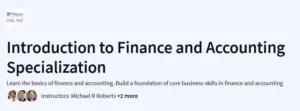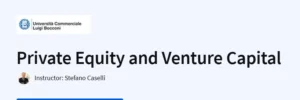What you will learn in Contabilidad para no contadores Course
- Definición y principios de la contabilidad: Comprenderás qué es la contabilidad, sus objetivos y los principios fundamentales que la rigen.
- Estados financieros básicos: Aprenderás a identificar y entender los principales estados financieros: balance general, estado de resultados y flujo de efectivo.
- Registro y clasificación de operaciones: Conocerás el proceso para registrar y clasificar las operaciones contables en cuentas específicas.
- Toma de decisiones basada en información financiera: Desarrollarás habilidades para interpretar la información financiera y tomar decisiones informadas en tu vida personal y profesional.
Program Overview
Introduction to Accounting
⏳ 1 hour
Introduction to the course and its objectives.
Overview of the role and importance of accounting in business.
Fundamentals of Accounting
⏳ 1 hour
Explanation of different types of accounting and regulatory principles.
Learn how accounting standards affect financial reporting.
Accounting Mechanics and Transaction Recording
⏳ 2 hours
Understanding the process of recording and classifying transactions.
Introduction to journal entries and ledger accounts.
Basic Financial Statements
⏳ 2 hours
Learn about the components and purpose of balance sheets, income statements, and cash flow statements.
How to read and interpret these financial statements.
The Balance Sheet
⏳ 2 hours
Structure and interpretation of the balance sheet.
Understanding assets, liabilities, and equity.
The Income Statement
⏳ 2 hours
Comprehending how revenues, expenses, and profits are reported.
Analyzing the income statement and its relationship to the balance sheet.
The Cash Flow Statement
⏳ 2 hours
Understanding the importance of cash flow in business operations.
How to track cash inflows and outflows.
Financial Statement Analysis
⏳ 2 hours
Techniques for analyzing and evaluating financial statements.
Understanding key financial ratios.
Practical Application
⏳ 3 hours
Applying the learned concepts through case studies and exercises.
Real-world application of financial accounting skills.
Get certificate
Job Outlook
- Proficiency in accounting is valuable for roles such as Accountant, Financial Analyst, Auditor, and Business Analyst.
- Skills acquired in this course are applicable across various industries, including finance, healthcare, retail, and manufacturing.
- Completing this course can enhance your qualifications for entry-level positions that require basic accounting and financial reporting skills.
Specification: Contabilidad para no contadores Course
|
FAQs
- The course is designed specifically for beginners with no prior accounting background.
- Basic math skills and familiarity with business terminology are helpful but not mandatory.
- Step-by-step explanations simplify financial statements, bookkeeping, and accounting principles.
- Exercises provide practical examples to build confidence in understanding accounting concepts.
- Teaches how to read and interpret key financial statements.
- Explains the relationship between revenue, expenses, and profits.
- Helps learners identify financial health indicators for personal or small business use.
- Provides practical examples without requiring complex calculations.
- Focuses on simple arithmetic and basic accounting principles.
- Uses easy-to-understand examples instead of advanced accounting formulas.
- Learners with high school-level math can comfortably follow along.
- Emphasizes understanding concepts rather than memorizing formulas.
- Helps manage personal budgets and track expenses effectively.
- Provides basic skills for small business bookkeeping and record-keeping.
- Teaches practical techniques for understanding profits, losses, and cash flow.
- Encourages better financial decision-making in daily or business activities.
- Lays a solid foundation in accounting principles for non-accountants.
- Prepares learners to take intermediate or advanced accounting courses with confidence.
- Builds understanding of terminology, financial statements, and basic bookkeeping.
- Complements practical experience or further studies in finance or business management.





